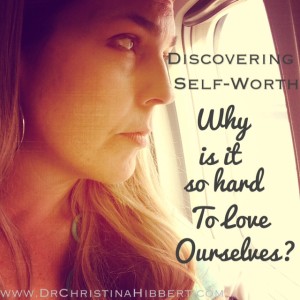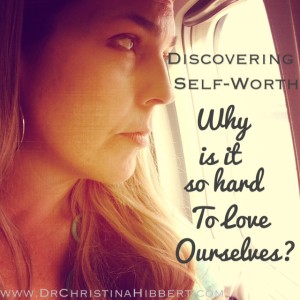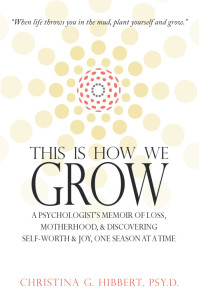
08 Jan Discovering Self-Worth: Why is it so hard to Love Ourselves?
 Why is it so hard? I’ve given a lot of thought to this question over the years, because the number one issue I see in my psychology practice is a struggle with self-worth. People may come in for help with depression, anxiety, relationships, or parenting, but underlying these challenges is almost always “low self-esteem,” a struggle to love oneself.
Why is it so hard? I’ve given a lot of thought to this question over the years, because the number one issue I see in my psychology practice is a struggle with self-worth. People may come in for help with depression, anxiety, relationships, or parenting, but underlying these challenges is almost always “low self-esteem,” a struggle to love oneself.
I’ve read, studied, and watched my clients, friends, family–and yes, myself–struggle to feel self-worth–to truly embrace, believe, and feel it, deep in our bones. I’ve written about how self-esteem is a myth and how we must instead dig down and discover our true, inherent worth. I’ve even developed a model for discovering self-worth, and I’m currently writing a book on self-esteem after a breakup, with more books to come on this important topic.
But it still makes me cringe each time I hear someone say, “I don’t know how to love myself,” or “I try to believe it, but deep down, I don’t feel my self-worth.” I cringe a lot.
Why is it so hard to Love Ourselves?
So, why is it so hard to love ourselves? Why can’t we just believe the books, experts, and centuries-old wisdom that tells us we are so much more than we feel we are? Why can’t we accept our strengths and our weaknesses? Why can’t we simply love ourselves and let love in? I don’t have all the answers for why discovering self-worth and practicing self-love are so hard, but I do have some ideas:
1) Our experiences don’t match what we’re told or shown in the world. We hear, “You are of worth,” “Each soul has infinite value,” “We are all beautiful, talented, amazing, in our own way,” and we may even believe it–for a while. Then, we go out into the harsh world where our beauty and talent are compared to others, where we are judged, and where we learn to judge ourselves. Suddenly, our self-worthy thoughts have vanished. Our own parents or family are often part of this self-doubt system. They may, knowingly or unknowingly, instill in us a struggle with self-worth, through years of criticism, mixed messages, or withheld love. Unfortunately, some live a whole life never hearing a kind word, never feeling the power of true, unconditional love. How can we believe we are worthy of love if we never experience love in its purest form? Even if our parents were loving and taught us self-worth, teachers, friends, and others around us can tarnish our sense of self-worth, if we buy into their lies. Media also contributes, for sure. Images of those who are slimmer, smarter, richer, faster, more creative, more successful, or more beautiful plaster the world outside, create doubt in our world within.
2) We tend to pay more attention to negative experiences than positive ones. In psychology this is called “The Negativity Bias,” and it means that we humans are much more likely to remember and hold to the negatives of life than the positives. We’re also more likely to let the negatives influence our future behavior. They stick to us like glue. We’ll never forget the time our teacher said we were stupid or that cute high school boy said we were ugly, yet we ignore the dozens of things the people who know and love us see and say about how beautiful and intelligent we are. We ignore all the positive evidence of our beauty and worth, opting instead to cling to the negatives.
3) We don’t trust ourselves. Bottom line. We might feel an inkling, or wonder, “Could it be I really AM amazing?” but we don’t believe ourselves. We discount what is already whispering of our worth within, in favor of the loud messages of doubt without. We then go looking for ways to build our “esteem” in the world–to feel better about ourselves by being better than someone else, or finding the right person to build us up, or becoming a perfectionist so we feel worthy of love. But all of these paths to “self-esteem” will ultimately fail, for they are each built on a system of self-doubt. Instead, we must learn to trust ourselves, to listen for and hear and trust the whispers within that show us our true value and worth, to let go of the opinion and voices of others and trust a greater Source.

This is my new favorite picture I took on our family trip to Mexico. Love the beauty and solitude. I was loving myself in this moment.
Discovering Self-Worth
To me, this is the answer for self-esteem problems: learn to tap into the truth within, to hear and feel it. Learning to create experiences outside that match those truths, learning to see the positive evidence around us and believe it–learning to trust, accept, and love ourselves. It can sound very easy, I know. Yet, I also know it’s not–otherwise we would all feel so much self-worth I wouldn’t be writing this. It’s simple, yes. But it’s not easy.
We’re going to work on it.
Help me get this discussion started, by commenting, below! I really am interested in understanding why self-worth is such a challenge for us, and specifically, for you. Why do you think it’s so hard to love ourselves? What stands in your way? Do any of my thoughts ring true for you, or is it something else? Let’s begin the self-worth revolution! Together, perhaps we can crush the myth of self-esteem and create a world full of self-worth. Wouldn’t that be lovely?
For more on discovering self-worth, be sure to check out my bestselling book,
Available now on Amazon.com!
 For support and insight to help you discover your own self-worth,
For support and insight to help you discover your own self-worth,
join my “This is How We Grow” Personal Growth Group!
FREE. Online. Growth.
Don’t miss a thing!
SUBSCRIBE, below, “like” my Facebook pages (Dr. Christina Hibbert; This Is How We Grow) and follow me on Twitter,Pinterest, & Instagram!
You may manage your subscription options from your profile
Related Posts/Articles:
Join my This is How We Grow Personal Growth Group!
Personal Growth & Self-Actualization
Goal-Setting: 5 Steps for Personal Growth Success
What I’ve Learned about Personal Growth from a Decade of New Year’s Themes


I think one of the major hurtles we face with self worth is in the company we keep. Sometimes we place far too much value on the criticisms our “friends” bestow on us. One of the hardest things we can do is to deny our friendship to someone we have known for a long time, but the truth is if we continue to surround ourselves with critics, we are fighting a losing battle to identify and build on the wonderful person you truly are. Self worth requires a support system that builds on the good within us and allows us to do the same for others.
You are so right, James. Self-worth most definitely requires a support stem that “builds on the good within us.” I agree, it’s very hard to let go of relationships that aren’t healthy, and yet, that’s what we must do if we are to ever feel our true worth and live a life of joy. Just wrote about that in my new post: http://www.drchristinahibbert.com/beyond-happiness-10-ways-to-increase-joy/ . Our relationships truly can make or break our self-worth. I appreciate you reading and sharing your wise thoughts!
I do agree that we need to speak life not death into ourselves. We are desperately searching for someone to do things when all along we need to take care of ourselves. We take ourselves for granted which happened to me 2 years ago while completing my graduate degree along with being a mother and a army spouse. I took on the responsibilities of my husband who was occupied with his work. Handling all the responsibilities left me drained and I watched myself saying things to hurt others. It took my heart to send some warnings to me that made me take an inventory of what I am doing. I realized that I did not do anything for myself. At first I thought this was selfish of me but then I gave myself permission and now I love to do things for me. The motto that I live by is”self care first and the rest will follow.”
I love how you wrote that, Annmarie, “Speak life an snot death into ourselves.” Beautiful. And you’re so right–if we care for ourselves, really love ourselves, we are much better at caring for and loving others, too. I love your motto and appreciate your words!
You have heard the saying about “blowing one’s own trumpet” and this can be frowned upon by society; especially the British. This saying can impede your own self worth. I suspect there is always a need for others to bestow this on to you; through words, actions and deeds. The sad reality is that this is not always forthcoming.
As adults there is always a need for this to be reinforced and from my experience children are the best recipients and vice versa.
Self- worth is available to all of us and in some; this is more fragile and all it takes are a few knocks from others for the cracks to appear.
Thanks Josie
You are so right, Josie. All it takes is a few knocks for cracks to appear. The more we focus on discovering true self-worth, however, the stronger we build ourselves so the cracks don’t come as easily. I always say if someone feels the need to “blow one’s trumpet” then they’re lacking a sense of self-worth. It’s a way to try and build ourselves up, but it doesn’t last. Reinforcement and compliments from others are very nice and we all need them, too, I agree. We can surround ourselves with loving people, and learn to let go of those who cut us down. Still, it all goes back to self-worth. If I believe I am beautiful, loving, valuable, talented, then it won’t matter as much what everyone else thinks. Thanks for your thoughts!
Self-worth is inextricably intertwined with success and failure. I believe, especially for young girls and women, that challenges of self-worth, value, respect, and love are rooted in a disconnect between the image of what we “should” be and what we “are.” Due to external pressures, we internalize our own feelings of “falling short” and it creates this vicious cycle of doubt and negativity. Confidence, esteem, and love are extremely challenging to attain when facing external pressures of perfectionism. I believe that quotes, sayings, and reaffirmation statements, such as, “I am me, and that is enough” can help one believe in oneself, love oneself, and feel worthy of love.
YEs, Maggie, I agree that our self-esteem are inextricably intertwined with success and failure. That’s why I try to differentiate between self-esteem and self-worth. Self-worth is knowing we are of value no matter whether we succeed or fail. We are always of worth. We may not feel like we are, and we may not feel confidence or even love, but we are always important–we always matter. This is why we must all work to do our best to understand our true worth, to feel it, and to help others do the same. THank you for sharing your suggestions for how to do this. Warmest wishes to you.
Other people’s criticism and comments that we perceive as negative are not. Our mistake is in thinking or perceiving they are. When others are for whatever reason unable to be honest with themselves they have difficult in being honest with us. If we take literally what dishonest people say to us and when we do not understand the message then naturally that will lead to self-doubt.
Our challenge is to decipher the code. The first step is to acknowledge the criticism: whatever someone says to us is intended to be helpful even if we do not see it like that or feel it is so the first thing to say is ‘thank you’. Thank you is the way or acknowledgement that that aspect of ourselves ( the aspect which has provoked the criticism from others) receives the help. We feel good about ourselves as a consequences. The next stage is to work out what the other person is really saying. If only they could speak their truth. Having identified that leads to understanding ourselves better.
If you work on the basis that anything anyone ever says to you is intended to be helpful and acknowledge it accordingly then self-doubt will become a thing of the past.
Re the negativity bias (which I haven’t read) we humans tend to forget we are creatures of light. To function as human beings, our systems open up to receive energy and close down to give. Opening is daylight oriented, closing a nighttime one so during the day we are active, at night we sleep. Our rhythmic ‘feeling’ system (attitude) is designed to be flexible, to respond to fluctuations in temperature and quality of light. That is why our moods and energy levels naturally vary.
Thought is how we direct the flow of energy. Without thought, our feelings would run wild and we’d become aimless and directionless. With a little thought we can do a lot. Where we go wrong is too much thought. Too much thought results in mind over matter. Mind over matter is designed to be used sparingly, in situations where we need to force ourselves to open or close when we’re not in the mood. Using mind over matter all or most of the time leads to disconnection between how we feel and what we think and consequently an inflexible attitude. We override our feelings by thinking we can when truly we cannot.
It is naturally easier to be negative than positive because opening to receive light stimulates so much more energy that we could cope with making us hyperactive. The function of thought is to control the flow of energy. When we exercise too much control and do so habitually we become stuck in our ways. Stuck in our ways interferes with the flexibility of attitude and leads to all manner of problems.
We like to go on holiday to relax. Meditation and other methods of getting in touch with ourselves have the same objective. Relaxation is the unsticking of attitude so that feeling and thought function in balance and harmony, unlike most of the time when feelings are ignored and mind over matter dominates. If we could learn to relax as we go, better still learn to do things in a state of relaxation, and only apply mind over matter sparingly, then we’d use less energy to achieve the same thing, and we’d find life a lot easier.
The secret is to only do something when you’re in the mood. Or if that’s not realistic for the life-style you’ve created for yourself then ensure you get enough sleep to be able to manage your commitments. The word ‘yes’ equates to opening up to receive more energy, the word ‘no’ to closing or shutting off the supply. The more accommodating you are, the more you say yes when truly you want to say no, the more you’ll take on board and quickly wear yourself out. Adjusting and fine-tuning ‘yes’ and ‘no’ regulates the flow of energy. The more adept you are the more at that in all areas of your life the more you’ll find things will naturally fall into place.
Remember: life is designed to be simple, we complicate it by the way we think.
I feel our self worth is wrapped up with the way we live our lives if we are being truthful and freely expressing who we are then our self worth becomes stronger and able to grow but when we are allowing our perceptions of how people expect us to be then our self worth becomes lower and weak.
I am a trainee counsellor and so I question my morals and beliefs alot. In me becoming a therapist I want to know the ins and the outs of my cognitive state so that I can not only form a therapietic alliance but that I myself will heal old wounds. I have to admit in my course I have alot of work and it can be overwhelming at times. My overall goal is to self love and self care for myself it is the biggest tackle I have ever encountered however its one that I am truely committed to. We owe it to ourselves to be the best we can be.
I know that a major part of my inability to love myself for so long was largely due to the religion I was raised in. Secondly was my parents. My father was a perfectionist and my mother a sn extreme pessimist….. In my religion, it’s taught that you love God first, others second (and always before yourself) then yourself last. It’s wrong to put yourself before otherS according to the religion. This was pounded into me from the day I was born. My father, the perfectionist, always held me to an almost unattainable standard. Nothing was quite good enough or wasn’t any worth unless perfect. My mother, true pessimist, never gave (and still doesn’t) give herself any worth. “Everything is always awful and the worst is bound to happen”
For me, at age 32, learning that I abandoned myself, has been life changing. Accepting all of my emotions and learning from the good and bad
From about ages 32 to 37 I battled depression and lost complete confidence in myself in spite of being educated, healthy, financially stable, and successful by societies definition and opinions. It was a dreadfully dark place. Self-esteem was and still is non-existent. Through the years of fighting like hell to recover from depression and to escape the tethers that religion and society attached to me that demanded I strive to gain their approval I learned to not seek a volatile external approval of someone or something that did not ring true to me. It took me a long time to learn to create and connect myself to a value system that was CREATED by me. Standard parenting methods simply DO NOT ADDRESS teaching children to create a value system that rings true to them, rather standard parenting tends to TEACH the child what to value from the parent or care-givers own experiences and value system regardless if it is healthy or rational at all. We must teach and enable the people in our own little world to create and establish a metric system and rubric to solidify a foundation that they can test the deluge of opinions, policies, procedures, events that social, religious, education or any other institution encourages them to adopt as their own. If our value system is created by properly valuing our strengths and accepting our weakness we can more readily put ourselves in relationships, jobs, social institutions that compliment us and allows us to grow, create, leave the world a better place.
The quest for healthy self-esteem is as elusive as Big Foot. People, even people deemed to be “experts” speak of it, look for it, try to better it, some even find compelling evidence that suggest it exist and is almost ours…yet it still remains elusive for the majority of people. Self-esteem and self-concept are contingent and tethered to each other leaving both volatile; whereas self-WORTH is an absolute truth worthy of building a foundation and operating our lives with a value system that in consistent and stable. It’s a MUCH happier place to know your worth and to deposit it in your own created value system.
Im not that good in expression my feeling. The comments are very helpfull.rhe biggest thing that im haven is not haveing any one to help me.
I believe self love and self esteem relates to our childhood, if we are raised in a normal family with a loving parents, self worth and self love is automatically instilled in us.
I have had a life full of trauma and abuse, however, the worst of my abusers couldn’t hold a candle to what I have done to myself….the things I have denied myself, the dangerous situations I put myself in, the times I allowed things to happen to me or did things I did not want to do but allowed. I am really trying to learn to trust myself but it is hard, and possibly not a good idea at times I have been thinking about how to go about setting boundaries with myself (and honoring the boundaries, its hard to tell me no)
I was under the impression for years that I DID love myself, but after suffering from chronic anxiety and depression as an adult, I slowly realized I must be neglecting myself, esp. in terms of persomal hygiene, because I was physically and psychologically neglected as an infant.
The message was clear :
If my own mother doesn’t care enough about me, than I must not be worth very much. It became engraved
in my psyche.
I think this is more common than we realize. We’re learning self-worth, and loving ourselves pretty well, until…chronic illness, a loss, mental health issues, etc, come and change everything. I’ve experienced this too, with cancer and chronic illness. It’s a different level of self-acceptance, self-love, self-compassion, and self-care. It’s a tough new learning process. I hear you. I understand. You are not alone. And with continued work, I know we can eventually heal these deep and powerful wounds.